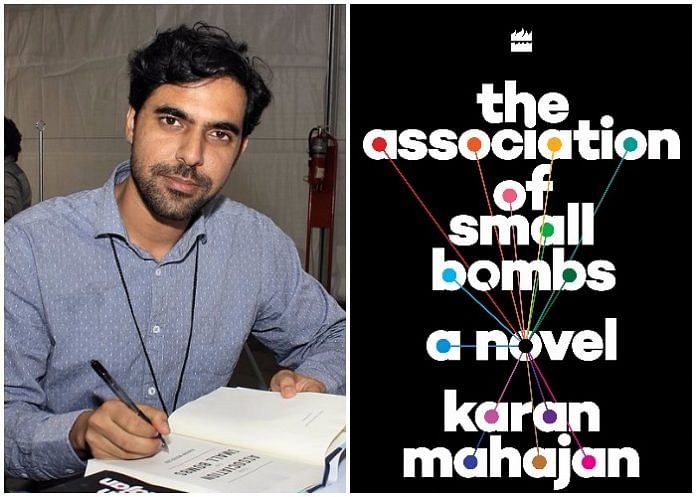There is nothing grand about this novel, and that is what it makes it all the more unsettling. Mahajan’s attention to details refocuses the readers’ attention from an intellectualised understanding of devastation, to a felt experience of it.
“I’m simply saying that the pain remains after the injury has healed.”
Karan Mahajan’s second novel, ‘The Association of Small Bombs,’ carries with it the weight of a legacy that his critically acclaimed first book ‘Family Planning’ left in its wake. The novel poetically unfurls like its central subject, splintering into many different narratives from the moment of explosion. His story, like “a good bombing, begins everywhere at once.”
A small explosion in the heart of Lajpat Nagar market claims the lives of Nakul and Tushar Khurana. It weaves together the destinies of a multitude of strangers — forming an unexpected association between terrorists, grieving parents, radical activists, and guilty survivors.
However, in his effort to approach the aftermath from all possible vantage points, Mahajan sometimes stretches himself too far. Mahajan walks you into the drawing room of a tragedy that is uncomfortably familiar and alien at the same time. It is almost as if you are a voyeur intruding on the pathos of Vikas and Deepa Thakur’s loss, the perversion of terrorist Shaukat ‘Shockie’ Guru’s fantasies, and the approaching madness of Ayub’s activism. The awareness that these are people you could bump into on the Delhi metro does not leave you, transforming into a nauseating fear that perhaps you already feel.
There is nothing grand about this novel, and that is what it makes it all the more unsettling. Mahajan’s attention to details of the unspectacular refocuses the readers’ attention from an intellectualised understanding of devastation, to a visceral and felt experience of it – “the leftover pieces — bright triangles of metal, serrated edges of bottle caps, nails — glittered in the pyre.”
The ‘leftover’ is a common thread running through the novel, that pulls you to the memory of what has been lost, while the plot simultaneously pushes forward. We feel the overwhelming presence of Nakul and Tushar in the lingering silence their absence leaves behind, almost as if their potential lives are playing out as their parents navigate an empty house.
The existential is approached through the mundane. We, as readers become painfully aware that our lives are inconsequential segments of a much larger web. We are only our ‘Response to Terror’ in this small association of bombs, because “Nothing happened, yaar. A few buildings fell. A few people were burning.”
Mahajan’s second novel shakes you where it matters most — at home. In the small, invisible intricacies of the quiet lives we lead every day, blissfully unaware of the larger plot that renders us powerless.
This book is shortlisted for the DSC Prize for South Asian Literature, 2017 whose winner is to be announced 18 November, 2017.
Read reviews of other books shortlisted for the prize:



